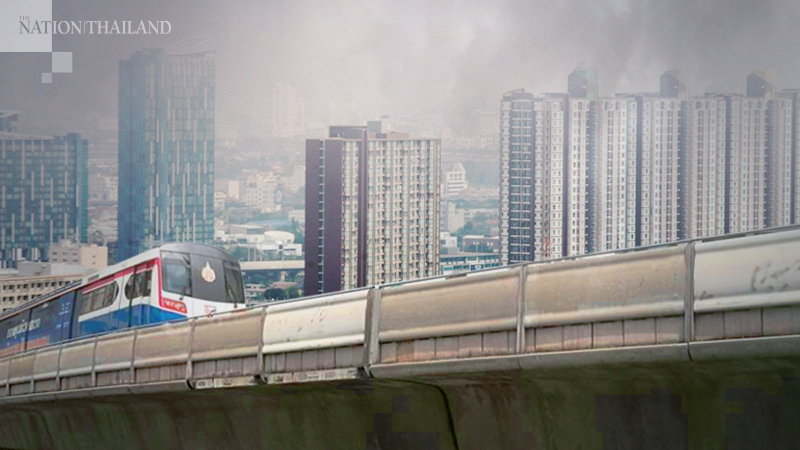Experts raise alarm on air pollution, urge government to update air quality index for vulnerable groups

Air pollution, especially in Bangkok, is worsening with the PM2.5 hitting dangerous levels in several areas.
In a press conference on Tuesday, Prof Dr Prasit Watanapa, dean of Mahidol University’s Faculty of Medicine, and Assoc Prof Nitipat Jiarakul, chief of Siriraj Hospital’s Division of Respiratory Disease and Tuberculosis, said it is necessary for the air-quality alarm system to be improved so people can protect themselves better. They also provided details on how minute particulate matter in the air can affect human health.
PM2.5 or particulate matter that is less than 2.5 micrograms in size and is created by car exhaust fumes, the burning of fields, construction and other substances created by agricultural processes. The amount of dust in the air usually rises during the cool season, though the PM2.5 levels depend very much on the sources, Nitipat said.
The main harmful components in air pollution are carbon, polycyclic hydrocarbons and heavy metals. When these substances enter the body, they cause severe inflammation and biological changes in the tissue from the nose to the lungs. This can result in nasal irritation, creation of mucus, sore throat and cough, as well as a higher risk of infections like pneumonia and even Covid-19, he explained.
People with chronic lung diseases like asthma and emphysema need to be particularly careful, he advised.
In the long term, air pollution can worsen the state of the lungs, and even cause emphysema among non-smokers as well as increase the risk of cancer because PM2.5 can enter the bloodstream and damage organs. It can also cause high-blood pressure, heart disease, cerebrovascular disease and chronic kidney disease as well as many other conditions like diabetes, wrinkled skin, dry eyes, vision impairment, sexual dysfunction, etc.
Though the public is aware of the dangers of PM2.5, it is necessary for the government to step in and introduce strict measures to control the sources of dust pollution as well as provide better alerts for vulnerable groups.
Dr Prasit said the authorities should revise the air quality index (AQI) and create a colour code to provide warnings for people sensitive to dust. At present, the AQI only provides warnings when PM2.5 levels rise above 50mcg per cubic metre of air (μg/m3), which is the Thai standard. In comparison, the World Health Organisation sets safe levels at 25μg/m3.
Dr Prasit has suggested that alerts be provided when air quality drops to 37.5(μg/m3) to warn those who are sensitive to dust.
